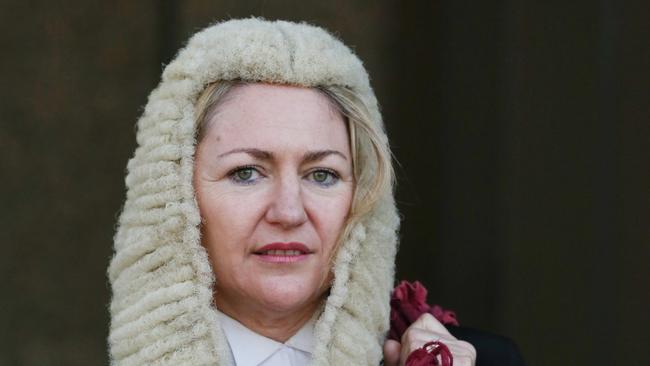In defence of Margaret Cunneen, servant of all the people
HER decision had to be the one that she judged to be more in the public interest than any alternative decision.

WHAT follows is a defence of Margaret Cunneen SC against unjustified attacks made against her by ill-informed persons. Those attacks have been aptly described in this newspaper by the eminent journalist Bettina Arndt as a witch hunt.
For those who know her either personally or by reputation, Ms Cunneen SC needs no defence. But many sincere people who do not know her or who are not familiar with the esoteric workings of the prosecution procedures of the NSW Director of Public Prosecutions may form falsely unfavourable opinions of her skill and integrity.
Ms Cunneen is a very highly regarded barrister: a Senior Counsel who has for many years practised as a crown prosecutor in the Office of the Director of Public Prosecutions.
I am not suggesting that Ms Cunneen is above criticism. But the advice she gave that led to recent attacks involved her making a difficult decision.
She was required to consider a large undefined number of factors of more or less significance. She did not have the comfort of mathematical or scientific certainty. Her decision had to be the one that she judged to be more in the public interest than any alternative decision.
After a magistrate has committed someone for trial, the documents go to the ODPP where a decision must be made whether the suspect should stand trial before a jury. There are a number of considerations.
Putting one person on trial on three separate occasions for three very similar offences after extensive publicity means it might be difficult to find juries untainted by the media coverage.
It is neither a disqualifying nor determinative factor, but it is one that should be taken into account.
It is most upsetting merely to witness the reaction of a girl or young woman who, at the end of a trial, hears a jury announce that the man tried for assaulting her is not guilty. Her reaction shows her distress.
Present in court may be members of her family, members of the public, court officials and others. This distress is aggravated when sometimes the acquitted man sneers or laughs at the visibly distressed victim.
It is the possibility of avoiding unnecessary additional grief to a victim of sexual assault that places sexual assault cases in a special category. This weighs on the mind of a crown prosecutor.
In many cases, victims of sexual assault, where the evidence is not strongly corroborated, are informed by the police, and later by the crown prosecutor that a conviction is not at all certain.
There can be no doubt that the decision to prosecute such a case must be carefully considered before it is made.
In some cases, suffering caused by the crime itself may be seriously aggravated by the stresses experienced during the lead-up to the trial, sometimes lasting for many months, only to end in the painful anticlimax of a not-guilty verdict.
A crown prosecutor would have such matters in mind.
Of course a crown prosecutor must be satisfied that there is evidence to prove each of the essential elements of the crime in question. But that is just one of the questions that the prosecutor must consider. She has to consider the weight — the proving force — as well as the availability of the evidence.
Ms Cunneen’s critics do not know what factors she took into account or what weight she gave to them. They are matters in her discretion.
It would be unfair after a lapse of 10 years to expect her to remember the weight she gave to every relevant factor or, indeed, what many of them were. Only a manifestly wrong finding could justify the kind of criticism she has received.
To suggest Ms Cunneen was wrong in not following the magistrate’s committal shows a misunderstanding of the law. A magistrate does not apply the many considerations to a case that a crown prosecutor must later consider, nor should he or she do so.
One certainty is that the decision should be governed by what would most serve the public interest.
As a crown prosecutor, Ms Cunneen understands that she is a servant of all the people: a minister of justice. No particular person or group of persons is her client.
Every member of the public is her client in every trial, and stands unseen as a party in the court: the prosecutor must think of the public as wanting a just and fair verdict, whatever it might be: guilty or not guilty.
A crown prosecutor who presents a case with appropriate vigour, skill and thoroughness, does her duty in the service of justice, whatever the verdict may be.
Ms Cunneen has a very wide and impeccable reputation for understanding and applying these standards.
Legal practitioners know that juries in criminal trials reach unanimous verdicts for different reasons. A jury’s verdict must normally be unanimous, but the reasons of each juror need not be the same.
I have little doubt that two prosecutors considering the same matter might reach the same conclusion, but influenced by different reasons.
It is critical that we remember that judgment is not a science; it is an art in which prosecutors — who are acting judicially — become more skilled with experience.
As a consequence, it is important that crown prosecutors should be experienced criminal law practitioners before being required to consider finding of bills of indictment; and those who would criticise them should also have had such experience.
I believe that the executive government and heads of jurisdiction, when appointing judges who may be required to evaluate the exercise of a crown prosecutor’s discretion, should appoint judges or legal practitioners who themselves have had experience in the practice of criminal law.
It is just as important that those persons reviewing any decision made by Ms Cunneen recognise she has that experience.
John Nader QC is a former NSW Supreme Court and NSW District Court judge


